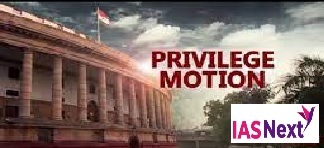CURRENT AFFAIRS
Get the most updated and recent current affair content on Padhaikaro.com
What is Privilege Motion?
- IAS NEXT, Lucknow
- 15, Dec 2021

Reference News-
Two Trinamool Congress MPs and three of the Congress have moved a privilege motion against former Chief Justice of India and Rajya Sabha member Ranjan Gogoi over his remarks that he attended the House when he felt like doing so.
- Since he joined the House in March 2020, Mr. Gogoi, a nominated member, has attended proceedings only six times.
What do rules say?
According to the rules, a member should attend at least one day during the session and if not, the member should apply for leave which has to be sanctioned by the House.
What’s the issue now?
During a recent interview to the NDTV, Ranjan Gogoi was asked about his attendance in Parliament. The former CJI had cited Covid curbs and discomfort with the lack of social distancing and seating arrangements.
- The motion says the statements constitute a breach and undermine the dignity of the House.
What are Parliamentary Privileges?
Parliamentary Privileges are certain rights and immunities enjoyed by members of Parliament, individually and collectively, so that they can “effectively discharge their functions”.
- Article 105 of the Constitution expressly mentions two privileges, that is, freedom of speech in Parliament and right of publication of its proceedings.
- Apart from the privileges as specified in the Constitution, the Code of Civil Procedure, 1908, provides for freedom from arrest and detention of members under civil process during the continuance of the meeting of the House or of a committee thereof and forty days before its commencement and forty days after its conclusion.
Motion against breaches:
When any of these rights and immunities are disregarded, the offence is called a breach of privilege and is punishable under law of Parliament.
- A notice is moved in the form of a motion by any member of either House against those being held guilty of breach of privilege.
Role of the Speaker/Rajya Sabha (RS) Chairperson:
The Speaker/RS chairperson is the first level of scrutiny of a privilege motion.
The Speaker/Chair can decide on the privilege motion himself or herself or refer it to the privileges committee of Parliament.
- If the Speaker/Chair gives consent under relevant rules, the member concerned is given an opportunity to make a short statement.
Applicability:
- The Constitution also extends the parliamentary privileges to those persons who are entitled to speak and take part in the proceedings of a House of Parliament or any of its committees. These include the Attorney General of India.
- The parliamentary privileges do not extend to the President who is also an integral part of the Parliament. Article 361 of the Constitution provides for privileges for the President.